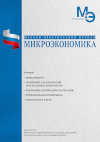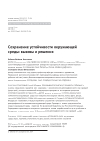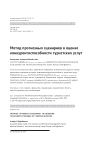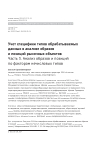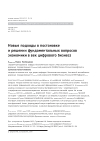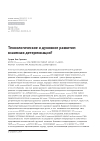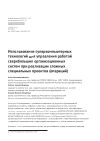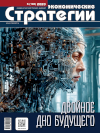Preserving environmental sustainability: challenges and solutions
DOI: 10.33917/mic-1.114.2024.75-86
In this article, the authors substantiate the concepts of sustainability, stability and risk of conservation and development of three macro–environments — economic, demographic and environmental (natural), based on the provisions of international documents on the creation of sustainable development processes in countries. The level of pollution and the degree of protection of such environmental components as surface water bodies, soil, fauna, flora, land as a territory and waste are based on specific examples of their current state in the Russian Federation and current problems of preserving and improving the economic, demographic and environmental components are identified. Proposals for environmental protection in draft Resolutions of the Government of the Russian Federation are analyzed. Risks expected in the future in the economic sphere are determined for each specific example based on the developed sustainability model, demographic and environmental conditions.
References:
1. The concept of Sustainable Development of the territories of the countries UN Conference on Environment and Development. New York, 1993. Vol. 1–3.
2. Kyoto Protocol to the United Nations Framework Convention on Climate Change: adopted December 11, 1997 Official text in Russian. Vebsayt OON. URL: https://www.un.org/ru/documents/ declconv/conventions/kyoto.shtml
3. Status of Ratification of the Kyoto Protocol. Internet Archive 04.04.2016. URL: http://unfccc.int/kyoto_protocol/status_of_ratification/items/2613.php
4. Paris Agreement. Veb-sayt OON. 2023. URL: https://www.un.org/ru/climatechange/paris-agreement
5. Babkin A., Bespalova S., Senetskaya L., Skotarenko O. Tools for digitalization of economic processes for supporting management decision-making in the Arctic region. IOP Conference Series: Earth and Environmental Science. 2019. Volume 302, Issue 1.
6. Babkina L., Skotarenko O. Features of the qualimetric approach in regional studies. Scientific and Technical Bulletin of St. Petersburg State Polytechnic University. Economic sciences. 2013;5:161–165.
7. Bykovskaia E., Maiurova A., Kustikova M., Timofeeva I., Tyurikova E. Assessment of the environmental risks in the development of fossil fuels deposits in the Arctic zone of the Russian Federation. IOP Conference Series: Earth and Environmental Science. 2021. Volume 723, Issue 5.
8. Zaychenko I. M., Kalinina O. V., Gutman S. S. Labor resources of the Far North territories: Problems and prospects Proceedings of the 28th International Business Information Management Association Conference — Vision 2020: Innovation Management Development Sustainability and Competitive Economic Growth. URL: https://www.scopus.com/inward/
9. Kozin M., Plotnikov V., Skotarenko O. Assessment of challenges, threats, and prospects in development of cities and towns in the Arctic zone. IOP Conference Series: Earth and Environmental Science. 2019. Volume 302, Issue 1.
10. On the national goals and strategic objectives of the development of the Russian Federation for the period up to 2024: Decree of the President of the Russian Federation dated May 7, 2018 No. 204. Legal reference system «Garant» URL: https://base.garant.ru/71937200/?ysclid=lly1f15vms458613544


